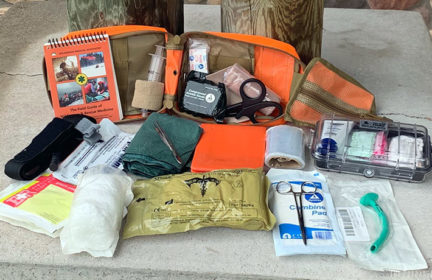Essential medical reference books for the prepper library
I wanted to start compiling a list of great medical references at different levels that are useful for austere medicine and hopefully longer term survival. Also curious what books others have found useful to study or have on hand as reference.
Quick reference
- Wilderness & Travel Medicine – fairly good first step and comes with larger AMK kits, which I like for the packaging. Written in an accessible and easily referenced way.
- NOLS WFA reference card – Good for rapid reference for those in your group who are less trained or practiced
First aid
- Wilderness Medicine (Forgey) – Well written and it has a good focus on being more remove from definitive care
- Fix Your Feet – A good reference on foot care. It is targeted more at runners and hikers, but if you suddenly increase time on your feet it will be valuable to know how to care for them
- Hypothermia, frostbite and other cold injuries – a good deep dive into cold injuries for those of us who live in climates with extreme cold.
First responder
- Outdoor Emergency Care – This is the textbook use for national ski patrols certification. I don’t love it, but it is a reasonable textbook at the FR/EMT level that also includes some more environmental emergencies and dealing with more austere situations such as backcountry rescue.
Advanced
- Auerbachs Wilderness Medicine – THE textbook for wilderness medicine. It is a 2 volume medical textbook, which is very comprehensive. Depending on your science background this could be a hard read.
What have others found?
-
Comments (15)
-
Gideon ParkerStaff - June 26, 2021
Great topic scott! One day we might have to be our own doctors if help is too far away or unavailable.
To be easier for people to know the exact book you are talking about, can I recommend adding the author’s name or a link to the book? I copy and pasted your recommended list and tried to find the book you may be referring to, correct me if I link to the incorrect source:
Quick reference
Wilderness & Travel Medicine: A Comprehensive Guide by Eric Weiss – fairly good first step and comes with larger AMK kits, which I like for the packaging. Written in an accessible and easily referenced way.
NOLS WFA reference card – Good for rapid reference for those in your group who are less trained or practicedFirst aid
Wilderness Medicine by M.D. William W Forgey – Well written and it has a good focus on being more remove from definitive care
Fixing Your Feet: Injury Prevention and Treatment for Athletes by John Vonhof – A good reference on foot care. It is targeted more at runners and hikers, but if you suddenly increase time on your feet it will be valuable to know how to care for them
Hypothermia, frostbite and other cold injuries – a good deep dive into cold injuries for those of us who live in climates with extreme cold.First responder
Outdoor Emergency Care: A Patroller’s Guide to Medical Care: A Patroller’s Guide to Medical Care by Edward C McNamara and David H Johe – This is the textbook use for national ski patrols certification. I don’t love it, but it is a reasonable textbook at the FR/EMT level that also includes some more environmental emergencies and dealing with more austere situations such as backcountry rescue.
Advanced
Auerbach’s Wilderness Medicine, 2-Volume Set by Paul S. Auerbach – THE textbook for wilderness medicine. It is a 2 volume medical textbook, which is very comprehensive. Depending on your science background this could be a hard read.
Again, great list and nice selection of books!
-
Scott P - June 26, 2021
Those all look correct. I was trying to get this written before heading out to guide this morning, sorry about no links.
-
Gideon ParkerStaff - June 26, 2021
No worries at all! Really appreciate you taking the time to write up this forum post.
That’s awesome you were a paramedic. Thank you for your service to so many people.
-
-
underprepraccoon - June 26, 2021
Where There Is No Dentist, Where There Is No Doctor, and general first aid training would help.
-
Scott P - June 26, 2021
Yes, I have both, but haven’t read them yet. I didn’t want to list anything I haven’t spent some time with. As for training I am I have that well covered (former paramedic).
-
-
Conrad B - June 26, 2021
Some medical books I’ve seen throughout many prepping groups are the ones by Joseph Alton. https://www.amazon.com/s?k=joseph+alton+md. I haven’t read them, but they seem to be very popular
-
Bob - June 26, 2021
Good morning Scott,
Real good – and timely – thread !
I’m addressing the “other books … useful to study … “.
Besides the above cited books, they’re here and inside of both covers are stuffed with related news articles, etc, books that help me focus on all this can be called the “tangents”, the indirect approaches. For example:
“The Ship Captain’s Medical Guide, 1975 (first pub 1929), various contributing authors, Her Majesty’s Stationery Office, London, ISBN: 0 11 510279 5. Book written and assembled for educated laity. Book highlights what to look for, record and treat, eg a matrix chart titled “Severe Abdominal Pain” … there’s a column with types of pain list – a cross-column probable cause of the pain list, …
It’s a pamphlet published by “Medical Advisory Systems” out of Maryland. By subscription/contract this medical company advises vessels at sea with guidance as to what to look for, … like above British book. One chart in their pub is titled “Injuries” with one example “Blood Coming From Ear(s).
I’m not a Barnicle Bill type; was in overseas offshore oil exploration injury. Oil companies gobbled these services up. Real good to know how to focus on what the patient is going through.
Also useful to me – as evidenced these pubs are still here with covers loaded with additions to subject matter – are the * older * Cold War medical manual written for the troops. Much protocol can be learned. For example:
Dept of the Army Field Manual (FM 8 – 35) titled “Transportation of the Sick and Wounded”, December 1955. Chapter 4 is titled “Aides in Litter Transportation” … The FM is loaded with pictures. Even has pictures of litter on a mule ! There’s a section on prep of patient for air evac on the new helicopter (Bubble-believe the OV-1) skids. Not in book but I’ve seen the sleeping bags the patients were placed in for the air evac. The hood was lined with a basic fur.
Also here are some emergency field dentistry pubs.
-
Bob - June 26, 2021
Must add the mental health pubs that I CARRY WITH ME.
An ideal pub for non-professionals is, IMO,
“Field Manual For Mental Health and Human Service Workers in Major Disasters” by Deborah J. DeWolfe, PhD, M.S. PH., pub by SAMHSA (small org of Dept of HHS). SAMHSA, Substance Abuse and Mental Health something, evolved into mental health matters beyond substance abuses.
Above is DHHS Pub No. ADM 90-537, current ed is 2013.
Must mention why I rely on this small pocket size pub and not the thick “Disaster Psychiatry” book that’s ultra expensive and restricted access;
This FM’s page 2 lists a “Key Concept”:
“Disaster mental health assistance is ofter more practical than psychological in nature”.
This pub is no-cost.
-
-
AT - June 30, 2021
I’m sad to report that Paul Auerbach passed away last week. No idea why…he was a fairly healthy 70 year old. I’ll second his books, WM Forgey’s Wilderness Medicine, and the Where There is No… Series. Where there is no… books in particular assume no medical background which can be helpful.
Some of my lesser known favorites are a little more on the technical side but surprisingly useful:
- Netter’s Concise Orthopedic Anatomy. This book isn’t just great as a guide to anatomy but also because it goes through each joint/bone/tendon and explains how they are often injured and how to identify the specific injury.
- Oxford Handbook of Tropical Medicine. It’s title is a little misleading because while it does cover all the usual tropical stuff, it’s also a guide to medicine in resource poor settings. Sadly, coming from the UK they misspell a lot of basic terms like diarrhoea and oesophagus.
- Trott’s Wounds and Lacerations, Emergency Care and Closure. Suturing and wound management comes up a lot on this forum and in my opinion, this is the best book around. It is a textbook, but it’s surprisingly readable and has a lot of pictures/diagrams.
These books are all a little pricy but most of the info is timeless and the older editions are available at a discount.
-
Scott P - July 1, 2021
WMS had a statement about his death. Apparently he had brain cancer. Very sad to lose such a key figure in wilderness medicine.
Yes, I can also highly recommend Wounds and Lacerations, Emergency Care and Closer. I gifted it to someone else when I left EMS years ago, but it is a great text.
-
Bob - July 2, 2021
My condolances also.
Thanks for posting AT.
-
Jim Piper - July 14, 2022
First and foremost, I would be hard-pressed to be convinced that one needn’t prepare themselves with something more than rudimentary medical knowledge and trauma care before even attempting to provide first aid and care to the ill. Infection too easily progresses to sepsis and death in a non-sterile environment. “Cooties” are everywhere.
All from the standpoint of medicine in a disaster where medical care might be significantly delayed or not coming at all:
I can’t say I’ve read them all, but I’ve read a lot with numerous on my bookshelf. Tops in my book (pun intended) is “The Survival Medicine Handbook” (Alton and Alton), an excellent treatise for “… when medical help is NOT on the way”. Comprehensively written trade paper back of some 660 pages written/compiled by and MD and his ARNP. Though its illistrations are all B&W, I would have preferred full color, but I’m sure that would have increased the book’s price significantly.
An terrific adjunct to the Survival Medicine Handbook is “Alton’s Antibiotics and Infectious Disease” (Alton and Alton) book. Drawing from and expanding on the info in the SMH, it offers suggestions for building a cache of antibiotics. The author’s discuss broad spectrum antibiotics and those that target specific types of bacterial infections. (Hopefully the untrained followers of this thread realize that antibiotics do not/will not be affect viral or fungal infections.)
A potentially highly useful reference in an EOTWAWKI scenario, the Merck Manual of Medical Home Edition. The Merck Manual is typically an MD’s reference. The Home Edition is written more for the layman.
In the extreme there is “Ditch Medicine, Advanced Field Procedures for Emergencies” (Coffee).
-
Magic 8 Ball - July 14, 2022
I see Alton and Alton’s books recommended time and time again but now that I finally have someone who has read them, what is your take on both The Survival Medicine Handbook and Alton’s Antibiotic and Infectious Disease books for someone new to the field of first aid. I want to pair it with some in person training, but are those books easy enough to understand for someone with very little experience?
I’m definitely not going to just buy them and leave them on the shelf and pull them out for the first time when someone’s leg is gashed open.
-
Jim Piper - July 14, 2022
I think I mentioned that Alton’s Abx book expands on what is in their Survival Medicine book, esp in the area of infectious pathogens (cooties 😉 and diseases.
IMHO, one of the higher (highest?) risks with infections (wound or otherwise) is sepsis.It is so dangerous that on a hospital acute care unit, if a patient exhibits s/s (signs and symptoms) of systemic inflammatory response syndrome (SIRS), the precursor to sepsis, a “Rapid Response” is called (not quite a Code Blue, which is the next higher response level). The patient likely gets moved into intensive care forthwith to head off full sepsis.
I don’t think I can overstate this: for the care giver/medic in a “help is not on the way” scenario, recognition and treatment is of paramount importance.
Such is the importance of even minor wound care. It ain’t dem zombies dat’s gonna git ya, it’s the cooties…
-
-
Doctor Tom - December 22, 2022
I am a newly retired Nurse Practitioner. I also have a PhD. I tell you that to add cred to my recommendations. I have found several excellent and rather inexpensive medical books for preppers. I have read through them several times and bought the hard copies for references.
Treating Life Threatening Conditions Preppers Get by Dr. Ryan Chamberlin.
The Survival Medicine Handbook by Dr. Joseph Alton and Amy Alton APRN
It is easy to get overwhelmed, I had to stop myself many times, reminding myself that I am not looking for a fully equipped field hospital. Prepping has to stop somewhere!
In Vietnam during the war, 905 of non wounded medical calls were for feet and Dental. The feet due to the necessity to be mobile, and the dental due to natural conditions where hygiene and first aid care is unavailable. So be sure to at least include dental emergencies in your prepping!
Antibiotics are easily obtainable–google Fish antibiotic–made by the same pharmaceutical companies.
Be sure you download what each is for and dosing info. Make sure all in your group takes care of pending medical / surgical / dental / optical issues NOW. Know everyone’s allergies.
Sorry…once I get started, I can’t seem to stop! I am glad to be a member here.
-
deans - July 26, 2024
Building a comprehensive prepper library should include essential medical reference books that cover a range of health concerns and emergency scenarios. Look for titles that provide practical guidance on first aid, wilderness medicine, and medical procedures that may be necessary in survival situations. Books like “The Survival Medicine Handbook” by Joseph Alton and Amy Alton offer detailed instructions on treating injuries, illnesses, and natural remedies when professional medical care is unavailable. Additionally, texts such as “Where There Is No Doctor” by David Werner provide valuable insights into preventive care and basic medical techniques essential for survival preparedness. Including these medical reference books in your prepper library ensures you’re equipped with the knowledge and skills needed to address health emergencies effectively, complementing other survival essentials like AC service and food storage preparations.
-
-
- News for the Week 2025-12-22 - 6 days ago
- News for the Week 2025-12-15 - 2 weeks ago
- News for the Week 2025-12-08 - 3 weeks ago
- Building a ‘hospital bag’ - 3 weeks ago
- News for the Week 2025-12-01 - 4 weeks ago
This forum is heavily moderated to keep things valuable to as many people as possible. Full community policies are here. The basics:
- 1. Be nice to each other.
- 2. Stay focused on prepping.
- 3. Avoid politics, religion, and other arguments.
- 4. No unfounded conspiracies, fake news, etc.
- 5. Debate ideas, not people.


